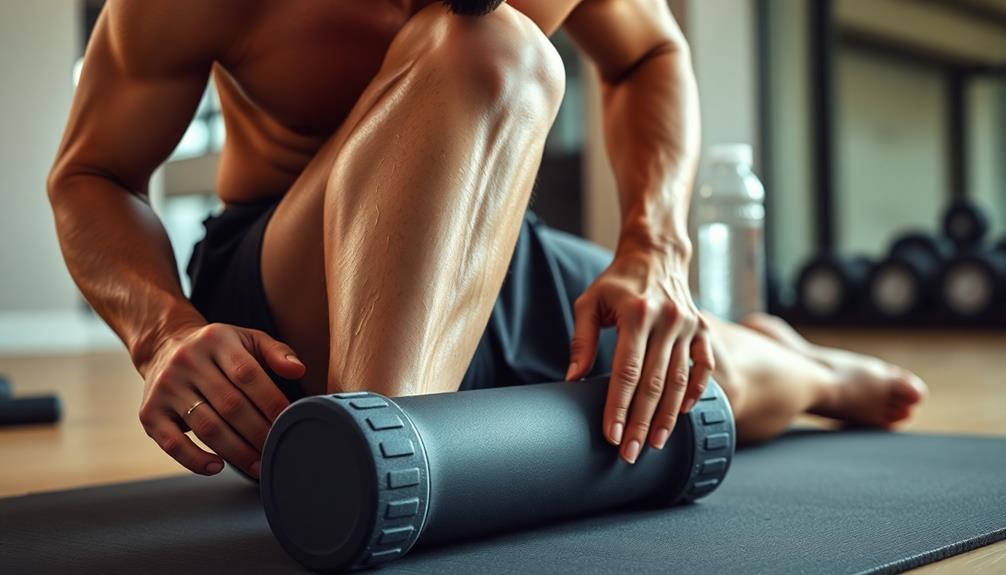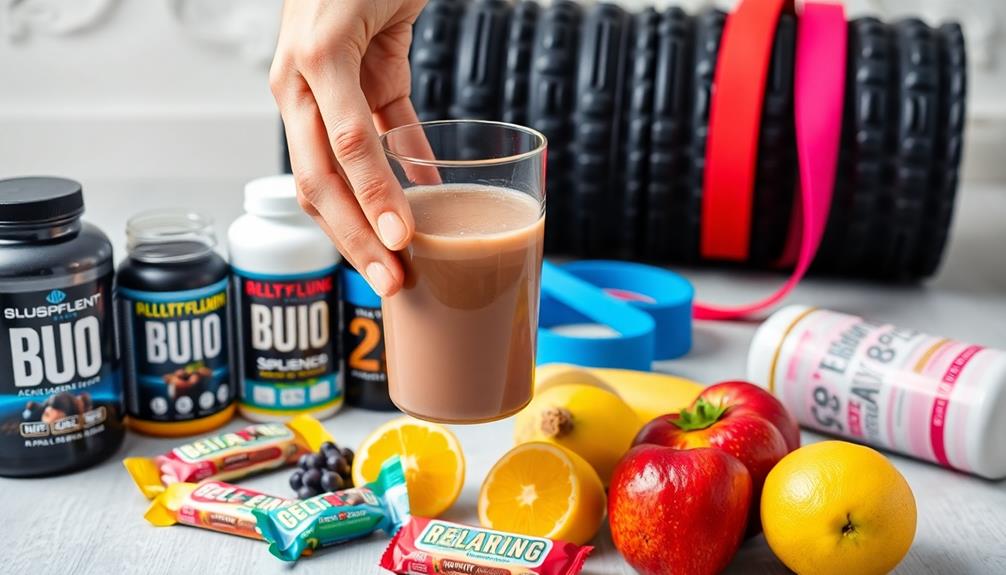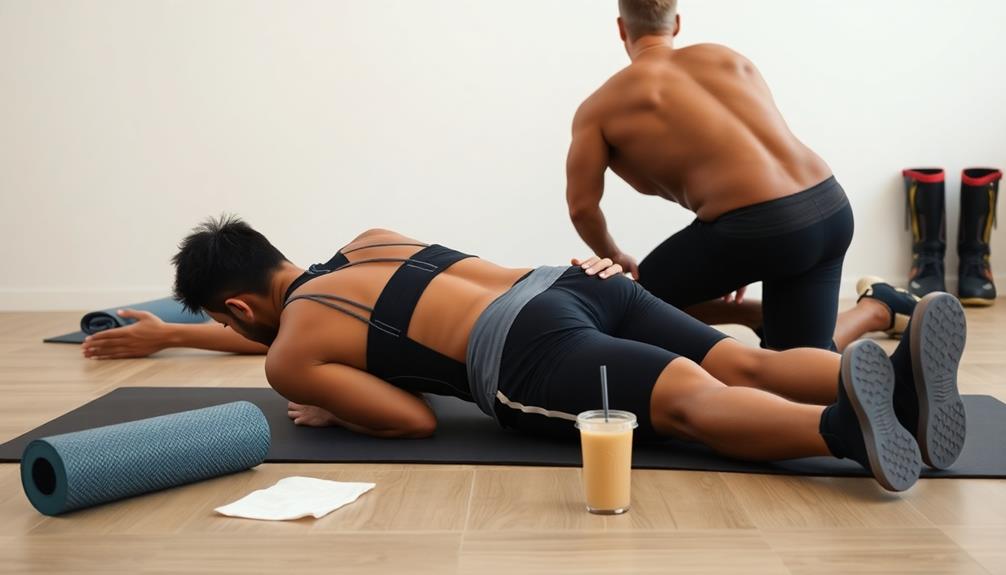To speed up muscle recovery after workouts, focus on these key strategies: Prioritize post-workout nutrition by consuming protein and carbs within 30 minutes. Stay hydrated by drinking water before, during, and after exercise. Get adequate sleep, aiming for 7-9 hours nightly. Utilize active recovery with low-intensity activities like light stretching or yoga. Try foam rolling to provide self-massage and improve blood flow. Consider cold therapy to reduce inflammation. Supplement wisely with scientifically-backed options. By incorporating these tips into your routine, you'll optimize your body's ability to repair and grow stronger. Let's explore each strategy in more detail to maximize your recovery potential.
Core Insight
- Consume protein and carbohydrates within 30 minutes post-workout to replenish nutrients and aid muscle repair.
- Stay hydrated by drinking water before, during, and after workouts to support muscle recovery.
- Get 7-9 hours of sleep nightly to allow growth hormones to repair muscles effectively.
- Engage in active recovery with low-intensity activities like light stretching or yoga to reduce muscle soreness.
- Use foam rolling techniques to provide self-massage, improve flexibility, and enhance blood flow to muscles.
Prioritize Post-Workout Nutrition

After a tough workout, your muscles need nutrients to recover. To speed this up, eat a mix of protein and carbs within 30 minutes of finishing.
Protein helps repair and grow muscle. Aim for 20-30 grams from foods like lean meats, eggs, or protein shakes. Shakes are an easy way to get protein fast after exercise. Carbs refill your energy and help your body use the protein. Choose complex carbs like whole grains, fruits, or sweet potatoes.
Remember to drink plenty of water too. It carries nutrients to your muscles and removes waste. If you sweat a lot, try a sports drink to replace electrolytes. Eating right after a workout kickstarts recovery so you're ready to train again sooner.
Stay Hydrated

Staying hydrated is key for muscle recovery. Water moves nutrients to your muscles and gets rid of waste. Drink water before, during, and after workouts to keep hydration levels up. Coconut water is a great option instead of plain water. It has natural electrolytes and potassium to help you stay hydrated and keep your muscles working well. You can also find sports drinks with coconut water that give extra perks for athletes and fitness fans.
Try to drink at least 8-10 glasses of water a day. You may need more if you exercise hard or when it's hot out. Don't wait until you're thirsty to drink since that means you're already dehydrated. Drink water all day long and check your pee color. If it's pale yellow, you're probably well-hydrated.
Think about drinks with electrolytes for longer or tougher workouts. They can put back minerals you lose when you sweat and help your muscles work their best. Remember, staying hydrated isn't just about drinking water. It's about keeping the right balance of fluids and electrolytes in your body.
Get Adequate Sleep

Sleep is crucial for muscle recovery. Your body releases growth hormones during sleep that help repair muscles damaged from exercise. Certain supplements can aid muscle recovery and sleep quality. Get 7-9 hours of good sleep each night for the best results.
Tips for better sleep:
- Go to bed and wake up at the same times every day
- Wind down before bed with a relaxing routine
- Skip caffeine and screen time in the evening
- Make your bedroom cool, dark, and quiet
If you can't fall asleep, try a warm bath, white noise, earplugs, or deep breathing exercises to relax.
Utilize Active Recovery

Active recovery is important for muscle repair and growth, but many people forget about it. Instead of just resting, try doing low-intensity activities that get your blood flowing and help with muscle soreness. This can help you recover faster and stay fit between workouts. Using massage balls to target specific muscles can make your active recovery even better.
Here are some easy ways to add active recovery to your routine:
- Go for an easy jog or walk
- Do some light stretching or yoga
- Take a relaxed swim or bike ride
- Try low-impact exercises using just your body weight
Try Foam Rolling

Foam rolling is a great way to help your muscles recover faster after exercise. It's like giving yourself a massage by rolling on a foam cylinder. This puts pressure on tight or sore spots in your muscles, helping them relax and feel better. Firm, high-density foam rollers work best for really getting into those problem areas.
Using a foam roller is simple. Put it under the muscle you want to work on, then slowly roll back and forth. If you find a tender spot, pause there for 20-30 seconds. Make sure to hit your quads, hamstrings, calves, and back. It might feel a bit uncomfortable, but it shouldn't hurt.
Foam rolling regularly can help you become more flexible, reduce muscle soreness, and improve blood flow to your muscles. Try it for 5-10 minutes after your workout or on days when you're not exercising. As you get used to it, you can foam roll for longer periods. It's an easy and effective way to take care of your hardworking muscles!
Consider Cold Therapy

Cold therapy, like ice baths and cold showers, can help your muscles feel better after tough workouts. When you get cold, your blood vessels get smaller. This helps with:
- Less muscle swelling
- Not as much tissue damage
- Better blood flow when you warm up again
- Faster recovery overall
Cold therapy works well, but some folks like using herbal supplements too. These natural options can work together with cold therapy for even better results. You don't have to sit in an ice bath for a long time. Start with just 30 seconds to 2 minutes, and slowly stay in longer as you get used to it. You can also use cold packs on certain spots or take a quick cold shower. Always pay attention to how your body feels and talk to a doctor before adding cold therapy to your after-workout routine.
Supplement Wisely

Supplements can speed up muscle recovery when used correctly. Stick to supplements backed by solid research for best results. Check out this easy guide on some top choices:
Whey Protein
- Helps repair muscle
- Take 20-30g after a workout
BCAAs
- Cuts down on soreness
- Take 5-10g during or after exercise
Creatine
- Boosts recovery
- Take 3-5g any time of day
Omega-3s
- Fights inflammation
- Take 1-3g with meals
Frequently Asked Questions
How Long Should I Wait Before Working Out the Same Muscle Group Again?
You should typically wait 48-72 hours before working the same muscle group again. This allows for adequate recovery and muscle repair. However, your exact timing may vary based on your fitness level and workout intensity.
Can Certain Types of Music Help With Muscle Recovery?
While there's no direct evidence that music helps muscle recovery, it can improve your mood and reduce stress. This may indirectly aid recovery by promoting relaxation. You'll benefit most from music you enjoy listening to during rest periods.
Does Age Affect Muscle Recovery Time?
Yes, age affects your muscle recovery time. As you get older, you'll notice it takes longer for your muscles to bounce back after workouts. Your body's repair processes slow down, so you'll need more rest between intense exercise sessions.
Are There Specific Clothing Items That Can Aid in Muscle Recovery?
Yes, you can aid muscle recovery with specific clothing. Compression garments, like tight-fitting sleeves, shorts, or leggings, can improve blood flow and reduce muscle soreness. Recovery-focused socks and sleepwear can also provide benefits during rest periods.
How Does Stress Impact Muscle Recovery and Repair?
Stress greatly hinders your muscle recovery and repair. It elevates cortisol levels, which can break down muscle tissue. You'll experience slower healing, increased inflammation, and reduced protein synthesis. Managing stress is essential for best muscle recuperation.

